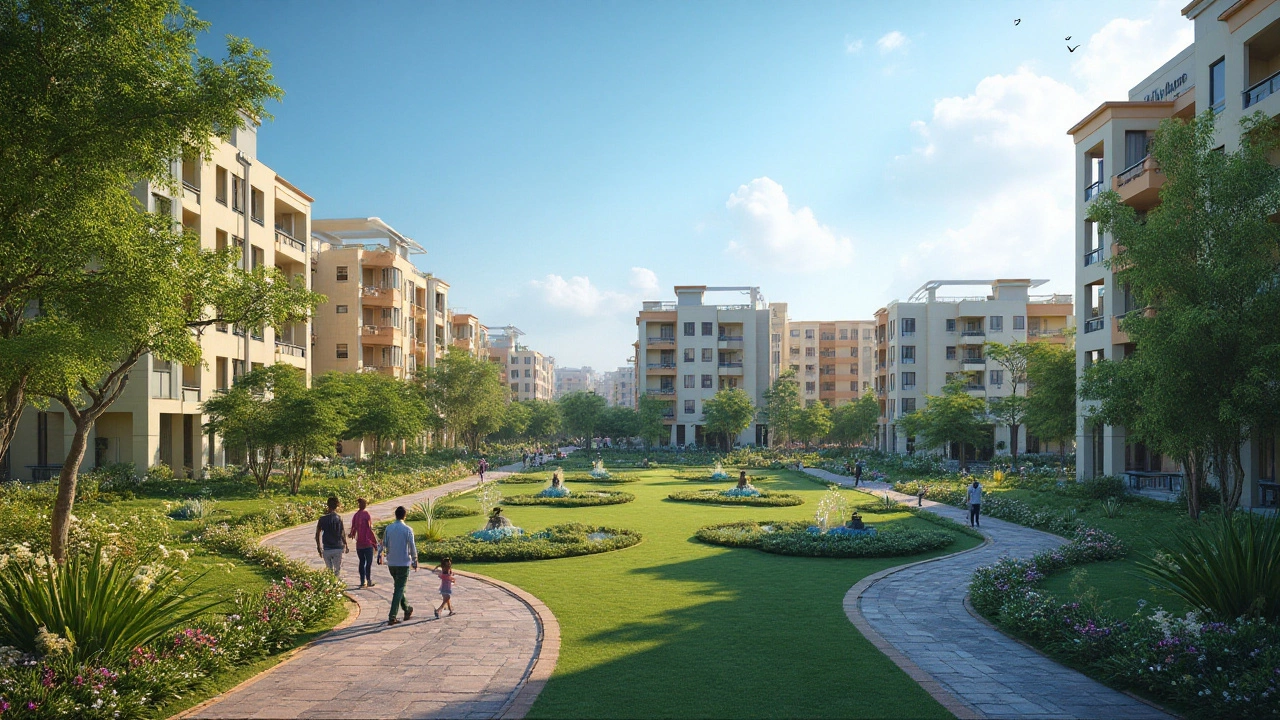When stepping into the world of renting a 2BHK apartment, one of the first things you'll encounter is the rental agreement, or RA as it's often called. This crucial document serves as the cornerstone of any rental arrangement, detailing everything from monthly rent and security deposits to rules about pets and maintaining the property.
Whether you're a first-time renter or someone who frequently moves, understanding the contents of a rental agreement can save you from future headaches. It's not just about signing on the dotted line; it's about comprehending what each term and clause means for your living situation. Through this article, we'll take a deep dive into the key elements of rental agreements, offer insights on navigating common pitfalls, and provide practical tips for finding the perfect 2BHK rental.
- Introduction to Rental Agreements
- Essential Components of a RA
- Legal Terminology Explained
- Common Clauses in 2BHK Rentals
- Tips for Renters
- Conclusion and Final Thoughts
Introduction to Rental Agreements
Diving into the realm of rental agreements can feel like untangling a web of legal jargon and stipulations, but at its core, it’s essentially a contract that clarifies the terms and conditions of renting a property. It's the foundational document that outlines the relationship between the tenant and the landlord. It specifies the rent amount, duration of the lease, and the rights and responsibilities of both parties. A well-drafted rental agreement can prevent misunderstandings, ensuring both tenant and landlord are on the same page about what’s expected. It's crucial to remember that each line in an agreement could have significant implications, which is why understanding this document is essential for anyone stepping into a new rental space.
A typical rental agreement will outline the rental price, payment dates, and penalties for late payment. It also often includes details about property maintenance responsibilities, specifying what repairs the landlord will undertake and what falls under the tenant’s obligations. Many agreements will include guidelines about alterations or renovations tenants might want to make, ensuring changes won't interfere with property functionality or value. The significance of such stipulations cannot be overstated, as they set the standard for daily living conditions within a 2BHK apartment.
In cities where rental markets are fiercely competitive, rental agreements might also express terms specific to location, such as noise ordinances or parking rules. Though these aspects may seem mundane, they influence the inhabitable nature of the rental. Those new to renting should not shy away from asking clarifying questions about their rental agreement. It's vital to comprehend every clause, especially when a term could equate to financial implications or impact one's standard of living. A common piece of advice is to approach rental agreements as one would any other significant contractual commitment, weighing the impact of every line.
"A rental agreement is not just a document but a testament to the mutual agreement of cohabitation between tenant and landlord." - John Smith, Real Estate Legal Expert
Beyond the content of rental agreements, the terminology used within them holds equal importance. Words like 'lessee' and 'lessor' are commonplace, referring to the tenant and the landlord, respectively. Comprehending such terms and legal stipulations helps tenants navigate the document with confidence and serves as a preventive measure against possible legal disputes. Decoding these terms often calls for thorough scrutiny or sometimes, professional legal guidance. Although initial rents may align with a tenant's budget, failing to understand terms like 'annual increments' or 'maintenance charges' can lead to unanticipated challenges down the road.
Interestingly, a rental agreement's structure might vary significantly depending on the property's location. Different regions adopt different standards based on local housing and rental laws. Municipalities may enforce specific guidelines in rental agreements to protect both landlords and tenants, so local customary practices often seep into these documents. Being aware of these local differences could be of immense benefit when transitioning between locales or moving to a new city. Thus, the folding layers of a rental process might incorporate unexpected elements that reach far beyond the immediate transaction of renting a living space. Understanding these distinctions requires a balance of legal knowledge and practical experience.
Essential Components of a RA
The foundation of any successful rental journey in a 2BHK apartment relies significantly on understanding what constitutes the rental agreement, often referred to as the RA. This document is not just a formality but rather a safeguarding mechanism for both tenants and landlords. At its core, it encapsulates the basic framework of the tenancy. In essence, the RA outlines the rent amount, the duration of the lease, and details who bears responsibilities for maintenance tasks. Yet, its scope extends far beyond these basics. Many agreements also specify the conditions under which either party can terminate the tenancy, which can prevent disputes should circumstances necessitate an early exit.
Within an RA, the roles and expectations of both the tenant and the landlord are delineated in a structured manner. Often, agreements will detail the property’s utilities and amenities covered, whether parking spaces are allocated, and if the tenant has access to shared facilities. It's vital these seemingly minute aspects are clearly described, reducing potential areas of conflict. Importantly, clauses specifying rules around security deposits — such as the amount due upfront, under what conditions part or all of it might be forfeited, and the timeframe for its return after tenancy concludes — are critical components. Ensuring these are explicitly stated can save significant hassles later.
In some cases, landlords might include clauses concerning alterations and improvements to the property. Tenants should keep an eye out for such details, as it can impact their plans for personalizing their living space. By agreeing upon these specifics upfront, both parties can avoid misunderstandings down the line. Fixed conditions about repairs and maintenance tasks are another essential inclusion and typically outline who is responsible for different types of repairs, from plumbing to pest control. A clear understanding of these responsibilities is essential as they often have financial implications.
"A comprehensive rental agreement can be thought of as the 'constitution' of a rental relationship, defining and protecting the rights of each party," explains Andrew Scott, a seasoned real estate consultant.
Another fundamental part of the RA includes an addendum for special situations, such as hosting guests for extended periods or subletting the apartment. These scenarios are becoming increasingly relevant as more tenants look for ways to share housing costs, particularly in urban areas where living costs are rapidly rising. Such clauses not only protect the landlord's property rights but help tenants understand their limitations in engaging third parties during their lease term.
Understanding the terms around potential penalties for late payment of rent or breaches of other sections of the RA is equally critical. Some agreements enforce late fees as a percentage of the rental amount, while others may charge a flat fee for delays. Familiarity with these types of clauses can prevent a souring of the rental relationship due to unpaid dues or misunderstanding of payment schedules. Information such as when rent is due and the accepted payment methods should always be unmistakably clear within the RA.

Legal Terminology Explained
When you sign a rental agreement, it's like entering a world with its own language, packed with terms that can be puzzling without a little guidance. At the heart of this understanding is 'lease term,' which refers to the period during which the 2BHK apartment is rented out to you. It could be month-to-month, yearly, or any other duration agreed upon by you and the landlord. It's crucial to understand every detail about the lease term, as this dictates not only how long you live in the apartment but also your obligations regarding giving notice when you plan to vacate.
Another term, often seen but sometimes misunderstood, is the 'security deposit.' This is an amount that you prepay, typically ranging from one to three months' rent, which the landlord holds as protection against damages beyond normal wear and tear. Knowing the conditions under which this deposit can be withheld is crucial. Some states even cap the amount landlords can demand, providing a safety net for tenants. Paying particular attention to the conditions for deposit return in your RA can prevent unpleasant surprises when it's time to leave.
Then we delve into 'rent control' clauses, which you might find in areas where governments regulate rental costs. These clauses control how much and how often a landlord can raise your rent. In the absence of rent control, terms like 'escalation clause' might come into play. This clause allows for rental hikes based on specific criteria, such as inflation or property tax increases. Understanding the ceiling of rental increases helps in predicting potential rises in your cost of living.
Understanding Default and Repairs
Understanding terms related to 'default' is equally important. Default occurs when there is a failure to meet the conditions set forth in the agreement, such as non-payment of rent. The repercussions can be severe, leading to eviction or legal actions. Hence, knowing the timelines and actions that constitute a default can help safeguard your rental journey.
Repair and maintenance clauses may seem tedious but are necessary to grasp fully. These terms define who is responsible for repairs and keeping the premises in top condition. The responsibility division can vary, with landlords typically handling structural repairs while tenants handle minor repairs. There should be a clause that explicitly lists these expectations to avoid potential disputes.
"Understanding rental agreement terminologies is the key to a smooth leasing experience," says property lawyer Amanda Nelson. "These terms are not just legal jargon but guidelines that can significantly affect your living experience."
For tenants, especially those new to renting, clarity on these terms can make a world of difference. It sets the foundation for a respectful and beneficial tenant-landlord relationship. As you immerse yourself in searching for 2BHK apartments, be sure to prioritize understanding these legal terms. Equipped with this knowledge, you stand a better chance of securing a rental that aligns perfectly with your needs and rights.
Common Clauses in 2BHK Rentals
Diving into the realm of rental agreements, particularly those related to 2BHK apartments, it’s important to familiarize yourself with the common clauses that often appear in these contracts. Understanding these can greatly assist tenants in knowing what to expect and protect themselves from potential disputes. One such prominent clause is related to the duration of tenancy. Typically, rentals span anywhere from six months to a year. This clause will specify the exact period you are committed to the property, and it’s essential to check for any mention of renewal terms or conditions for lease termination.
Another key clause to be vigilant about is the security deposit requirement. In most cases, landlords request a deposit equivalent to one to two months' rent. This deposit is a safety net for landlords, covering potential damages or unpaid rent. Tenants should keenly review this section to know the conditions under which deductions can occur, and the timeframe for refunding the balance post-lease. Interestingly, in a survey conducted by National Multifamily Housing Council, it was found that about 83% of tenants reported security deposit deductions as the main point of contention during rental negotiations.
According to Aaron Terrazas, a seasoned real estate expert, "Tenants often overlook the importance of documenting the state of the apartment at the start of their lease. This simple step can mitigate disputes related to security deposit return at the end of the stay."
Similarly, maintenance obligations form a crucial part of rental agreements. This section outlines the responsibilities of the landlord and the tenant when it comes to repairs. Generally, landlords cover major repairs like plumbing or electrical issues, while tenants might be responsible for minor upkeep such as changing light bulbs or maintaining the garden, if applicable. Boundaries should be clearly set to prevent misunderstandings, and any applicant should ask the landlord for clarity if this clause is ambiguous.
Pets and Rental Restrictions
A notoriously tricky clause revolves around pet policies. If you’re an animal lover, this is one segment you cannot afford to ignore. Some rental agreements might have a strict no-pet policy, while others may allow pets but with certain limitations on size and breed. An additional pet deposit may be required or a monthly pet fee, which can vary widely. For example, a report by Zillow indicated that 43% of renters own a pet, making it essential for landlords to outline these rules in detail to avoid potential confrontations.
Moving beyond the basics, usage restrictions often stipulate what activities can take place within the premises. For instance, running a business from your 2BHK apartment might be prohibited unless explicitly stated otherwise. Additionally, hosting large events or subletting agreements should be scrutinized as such activities often breach standard rental terms. By taking the time to delve deeply into these aspects, you can ensure your stay is harmonious and free from legal entanglements.

Tips for Renters
Renting a 2BHK apartment involves more than just finding the right location and price. To ensure a smooth experience, it is crucial to pay attention to several key areas. First, always read the rental agreement thoroughly before signing. This document is not merely a formality; it defines the bounds of what is allowed and what is not during your tenancy. Look out for hidden clauses or terms that may affect your stay, such as fees for maintenance or restrictions on having guests or pets. Asking questions and seeking clarifications at this stage can prevent conflicts down the line. Surprisingly, a significant number of renters overlook these details, resulting in avoidable disputes later.
The second important consideration is financial planning. Start by clearly understanding all associated costs. The monthly rent is just one part of the equation. You may also need to account for a security deposit, which can range from one to two months' rent, utility bills, monthly maintenance charges, and parking fees, if any. Being aware of all these costs can help you manage your finances better and avoid any surprises that might strain your budget. Lease terms such as the duration of stay, rules regarding subletting, and deposit refund conditions should be scrutinized as well.
Another crucial tip is to inspect the property thoroughly before moving in. Make a checklist and look for any existing damage or areas that need repair. Take photos or videos as evidence of the property’s condition upon moving in. These can serve as proof during an eventual move-out inspection and ensure your security deposit is returned in full. Some landlords are proactive in fixing issues, but having documented proof is always a good backup plan.
According to RealSimple, 'A documented checklist of issues negotiated with your landlord can serve as a lifesaver when it comes time to move out.'
Networking and word-of-mouth can also be invaluable resources when hunting for a 2BHK apartment. Speaking to current or former tenants can provide honest insights about the property and landlord. Real estate forums and communities can offer additional perspectives and advice. Remember that a satisfied tenant is more likely to give you the real picture than a generic online listing might.
Finally, ensure that your lifestyle aligns with the leasing terms and conditions. If you value flexibility, aim for properties with short-term leases or those that allow subleasing. If stability and long-term planning are priorities, then look for leases with dependable renewal terms or a fixed rent to avoid unexpected hikes. Always have a plan B in place in case things don't turn out as expected. Equity Trust conducted a study showing that 47% of American renters do not have a contingency plan if they had to vacate unexpectedly.
In conclusion, staying informed and proactive can greatly enhance your renting journey, transforming it from a simple transaction into a rewarding home experience. Armed with the right knowledge and strategies, you can navigate the rental market with confidence, ensuring your time spent in your 2BHK is enjoyable and free of unnecessary hassles.
Conclusion and Final Thoughts
Having reached the end of this exploration on rental agreements for 2BHK apartments, it's crucial to stress that these documents are more than just contracts—they are blueprints for a harmonious living arrangement. A well-crafted rental agreement can set the stage for a positive relationship between tenants and landlords, minimizing disputes and ensuring that both parties are on the same page. Remember, each clause, though at times overwhelming, serves a purpose. From specifying the rules of decorum within common areas to clarifying the procedures for requesting repairs, these details aim to prevent confusion and establish a clear protocol for addressing potential conflicts.
While the legal jargon may seem daunting, breaking down each section and understanding it thoroughly is a tenant's best defense against unexpected surprises. Engaging in an open dialogue with landlords about the lease terms before signing can also foster trust and transparency. As an informed renter, your thoroughness now can save you unforeseen troubles later. As the legendary author, Maya Angelou, eloquently put it,
"Do the best you can until you know better. Then when you know better, do better."This ethos certainly rings true in the realm of renting.
Through careful analysis and understanding of the rental process, tenants are better equipped to negotiate favorable conditions that suit their needs while respecting the rights of landlords. After all, successful tenancies are built on the foundation of mutual respect and clear expectations. The landscape of renting is ever-evolving, with new practices and technologies shaping how agreements are managed. One interesting trend shows that digital agreements, with their electronic signatures and e-filing systems, are contributing to a more eco-friendly and efficient rental market.
In wrapping up, it's also worth mentioning some helpful statistics: Studies suggest that up to 40% of renters overlook at least one significant term in their rental agreements. This emphasizes the importance of due diligence and perhaps even consulting with professionals for particularly complex leases. Ultimately, an informed tenant is a proactive tenant, ready to embrace the challenges and opportunities of renting a 2BHK apartment. May your rental journey be smooth, your experiences enriching, and your dwelling spaces filled with warmth and comfort.





